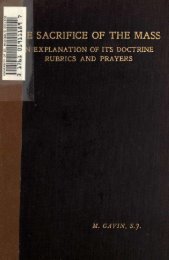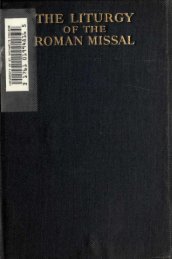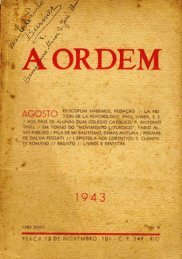E SACRIFICE OF THE MASS
E SACRIFICE OF THE MASS
E SACRIFICE OF THE MASS
Create successful ePaper yourself
Turn your PDF publications into a flip-book with our unique Google optimized e-Paper software.
APPENDIX. 189<br />
Let us now consider the views of those who assert<br />
that the Mass should be conducted in a language<br />
The objection wherever<br />
"understanded of the people."<br />
found, implies an unconscious ignorance of the true<br />
nature of the Holy Sacrifice. Mass is not merely a<br />
prayer, in which the faithful join, as they take part in<br />
a litany. Mass is the public official act of service which<br />
is said in the name of the Church for the living and the<br />
dead. Mass is offered, not by any one, but by a man on<br />
whom a great Sacrament has been conferred to enable<br />
him to convert bread and wine into the Body and Blood<br />
of our Lord. This official act is always public, because<br />
offered in the name of the Church. A private Mass,<br />
strictly speaking, does not exist. Mass in a hermit s cell<br />
without a server is a magnificent act of public worship<br />
"<br />
offered by the Church to God for all faithful Christians,<br />
living and dead." The people do join in the Mass,<br />
but they cannot offer sacrifice in the same manner as<br />
the priest. They are bound to be present at Mass on<br />
Sundays and holidays. There is, however, no obligation<br />
to follow the Mass prayers. The poor man, saying his<br />
beads, most certainly fulfils his obligation of hearing<br />
Mass. Is it not strange, too, that there should be this<br />
cry in favour of the vernacular, when half the Mass,<br />
and that the more important, is said in secret, and is<br />
inaudible to the congregation ?<br />
But an interesting historical incident shows the<br />
Church s mind as to the kind of language appropriate<br />
for the solemn services of the Mass. Early in the<br />
sixteenth century, Father Couplet, the Procurator<br />
General of the Jesuit Missions in China, on behalf of<br />
the missionaries, petitioned for leave from Paul V. to<br />
say Mass and Office in Chinese, and to use the same<br />
language in administering the Sacraments. Here is the






